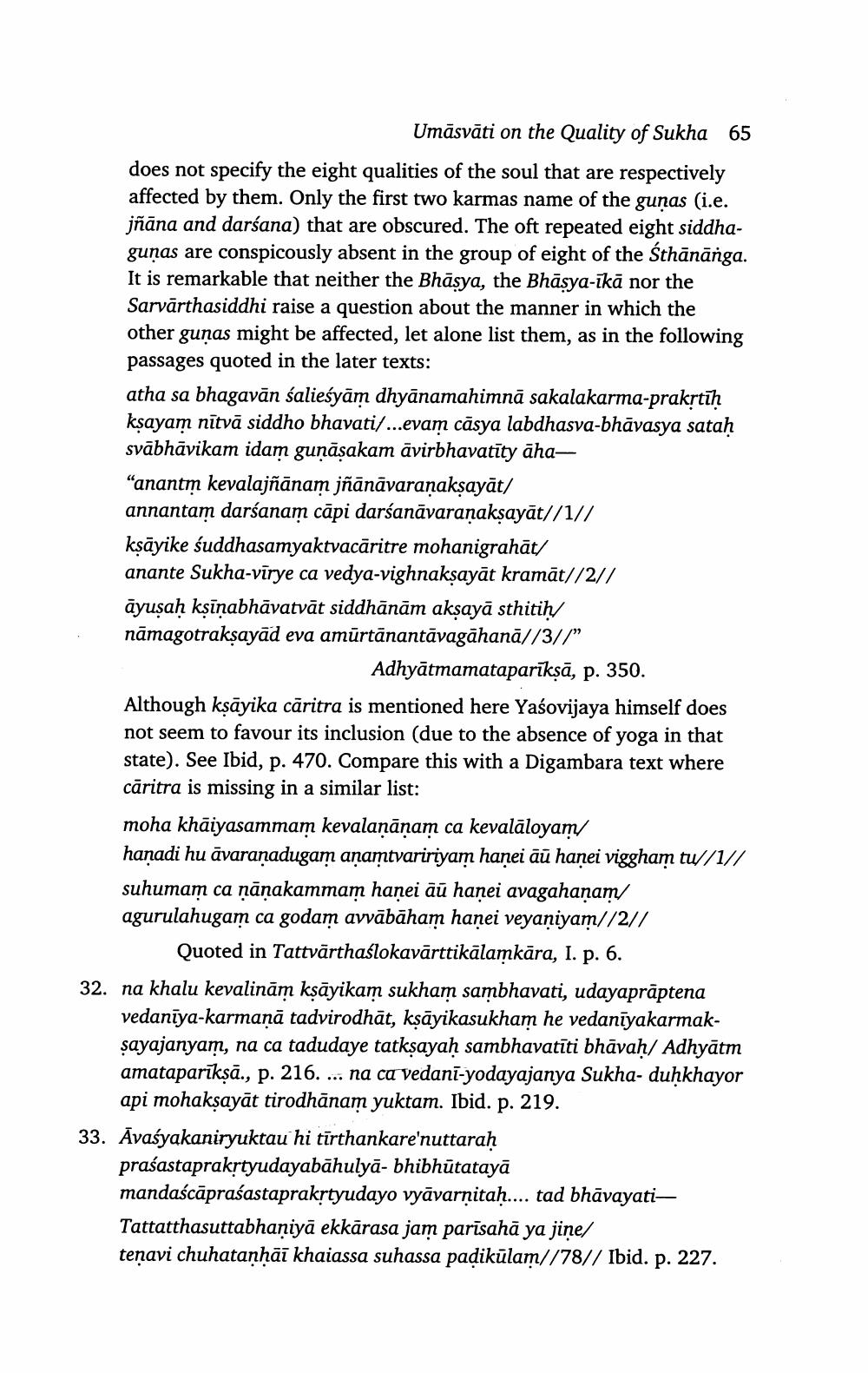________________
Umāsvāti on the Quality of Sukha 65 does not specify the eight qualities of the soul that are respectively affected by them. Only the first two karmas name of the gunas (i.e. jñāna and darśana) that are obscured. The oft repeated eight siddhaguņas are conspicously absent in the group of eight of the sthānanga. It is remarkable that neither the Bhāsya, the Bhāsya-īkā nor the Sarvārthasiddhi raise a question about the manner in which the other gunas might be affected, let alone list them, as in the following passages quoted in the later texts: atha sa bhagavān salieśyām dhyānamahimnā sakalakarma-prakstīḥ ksayam nītvā siddho bhavati/...evam cāsya labdhasva-bhāvasya sataḥ svābhāvikam idam guṇāsakam āvirbhavatīty āha“anantm kevalajñānam jñānāvaranakṣayāt/ annantam darśanam cāpi darśanāvaraṇakṣayāt//1// kṣāyike śuddhasamyaktvacāritre mohanigrahāt/ anante Sukha-vīrye ca vedya-vighnaksayāt kramāt//2// āyuşaḥ kṣīņabhāvatvāt siddhānām akṣayā sthitih/ nāmagotraksayad eva amūrtānantāvagāhanā//3//”
Adhyātmamataparīksā, p. 350. Although ksāyika caritra is mentioned here Yaśovijaya himself does not seem to favour its inclusion (due to the absence of yoga in that state). See Ibid, p. 470. Compare this with a Digambara text where cāritra is missing in a similar list: moha khāiyasammas kevalaņāņam ca kevalāloyam/ hanadi hu āvaraṇadugam anamtvaririyam haņei āū haņei viggham tu//1// suhumam ca ņāņakammam hanei āū hanei avagahanam/ agurulahugam ca godam avvābāham hanei veyaniyam//2//
Quoted in Tattvārthaślokavārttikālamkāra, I. p. 6. 32. na khalu kevalinām ksāyikam sukham sambhavati, udayaprāptena
vedanīya-karmaṇā tadvirodhāt, kṣāyikasukham he vedanīyakarmaksayajanyam, na ca tadudaye tatkşayah sambhavatīti bhāvah/ Adhyātm amataparīksā., p. 216. ... na ca vedani-yodayajanya Sukha-duhkhayor
api mohaksayāt tirodhānam yuktam. Ibid. p. 219. 33. Āvaśyakaniryuktau hi tīrthankare'nuttaraḥ
praśastaprakstyudayabāhulyā- bhibhūtatayā mandaścāprasastaprakstyudayo vyāvarņitaḥ.... tad bhāvayatiTattatthasuttabhaniyā ekkārasa jam parīsahā ya jiņe/ tenavi chuhataṇhāī khaiassa suhassa padikūlam//78// Ibid. p. 227.




